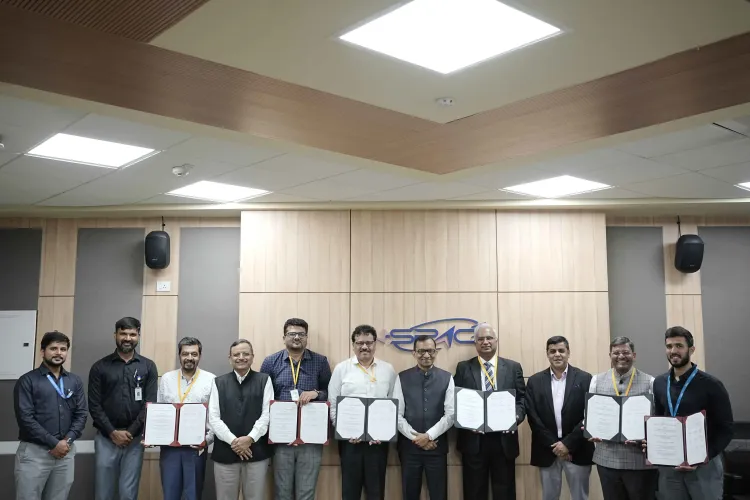What Are the 10 ISRO Technologies Transferred to Indian Firms?

Synopsis
Key Takeaways
- Transfer of 10 ISRO technologies to six Indian companies.
- Focus on enhancing self-reliance in space technology.
- Collaboration between ISRO, IN-SPACe, and industry players.
- Technologies include inertial sensors and geospatial models.
- Expected to boost innovation and industry participation.
New Delhi, July 3 (NationPress) The Indian National Space Promotion and Authorisation Centre (IN-SPACe) announced on Thursday that it has successfully facilitated the transfer of 10 cutting-edge technologies developed by the Indian Space Research Organisation (ISRO) to six Indian companies.
The tripartite Technology Transfer Agreements (TTAs) were executed between NewSpace India Limited (NSIL), the six companies, and IN-SPACe at their headquarters located in Ahmedabad.
This technology transfer will empower private enterprises to utilize the advanced technologies developed by ISRO, allowing them to harness space-related innovations for commercial use across various sectors.
The technologies, which enhance satellite launch capabilities, ground station infrastructure, and geospatial applications, are anticipated to significantly increase industry involvement, promote indigenisation, and lessen reliance on foreign technologies.
“The transfer of these technologies represents a critical milestone in empowering the private sector to capitalize on and commercialize space technologies. ISRO possesses a vast repository of R&D in space technologies, and now is the time to maximize that potential to fortify India’s space industrial ecosystem, where industry-led innovation is essential,” stated Dr. Pawan Goenka, Chairman of IN-SPACe.
Two advanced inertial sensors - the Laser Gyroscope and the Ceramic Servo Accelerometer, developed by ISRO’s Inertial Systems Unit for use in satellite launch vehicles, have been transferred to Zetatek Technologies based in Hyderabad. The firm boasts over 25 years of experience in Inertial Navigation System (INS) testing, calibration, and QA/QT equipment.
Three technologies related to ground station operations - S/X/Ka tri-band dual circular polarised monopulse feed, tri-axis antenna control servo system, and Ku/C/L and S Band Cassegrain feed - have been transferred to Avantel and Jisnu Communications, both companies specializing in comprehensive communications solutions for space and defense applications.
These technologies, which are currently sourced from foreign suppliers, will facilitate self-sufficiency in crucial ground station infrastructure.
Moreover, two geospatial models developed by SAC/ISRO for pest forewarning and semi-physical crop yield estimation have been handed over to Amnex Info Technologies in Ahmedabad, aimed at enhancing agricultural decision-making and crop protection.
A compact, multi-parameter, portable bathymetry system created by NRSC/ISRO has been transferred to Jalkruti Water Solutions in Ahmedabad, designed to support UAV-based water resource monitoring.
Additionally, VSSC/ISRO’s ceramic-based flame-proof coating technology, originally developed for launch vehicle applications, has been acquired by Ramdev Chemicals in Ahmedabad for broader industrial uses.
“This transfer is a pivotal move towards developing indigenous capabilities within India. ISRO, IN-SPACe, and NSIL will provide collaborative support to all industry players to ensure successful technology absorption,” remarked Rajeev Jyoti, Director of Technical Directorate, IN-SPACe.









